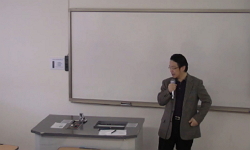Defoe’s Robinson Crusoe might be termed an originary novel in the sense in which it reveals, at the same time as it conceals, the historical process of its own making in a singularly primordial way. Composed by the self and composing the self, its n...
http://chineseinput.net/에서 pinyin(병음)방식으로 중국어를 변환할 수 있습니다.
변환된 중국어를 복사하여 사용하시면 됩니다.
- 中文 을 입력하시려면 zhongwen을 입력하시고 space를누르시면됩니다.
- 北京 을 입력하시려면 beijing을 입력하시고 space를 누르시면 됩니다.
https://www.riss.kr/link?id=A106935465
- 저자
- 발행기관
- 학술지명
- 권호사항
-
발행연도
2005
-
작성언어
English
- 주제어
-
등재정보
KCI등재
-
자료형태
학술저널
-
수록면
221-252(32쪽)
- 제공처
-
0
상세조회 -
0
다운로드
부가정보
다국어 초록 (Multilingual Abstract)
Defoe’s Robinson Crusoe might be termed an originary novel in the sense in which it reveals, at the same time as it conceals, the historical process of its own making in a singularly primordial way. Composed by the self and composing the self, its narrative mode of double genitive implies a split consciousness compelled to take its own process of unfolding into account. The novelistic consciousness (or Crusoe the novelist) functions here to lay siege to, and capture, the dislocating expanse between the colonist’s rambling wanderlust and his narrative desire for composition/composure. In the process, Crusoe’s island, the no-man’s-land on whose alien/alienating shore Crusoe the rambler finds himself stranded, is paradoxically transformed into the realm of bare, naked bodies in which the distinction between violence and law, exception and rule, fact and fiction, etc., is wholly effaced. The resulting narrative topography discloses the event of Ur-sprung or originary rupture at the threshold of modernity in which the phantasmatic opacity of reterritorialized colonial bodies is subtended by, and suspended over, sovereign gaze as the disembodied apparatus of technology.
목차 (Table of Contents)
- I. Between History and Romance : The Double Origin of Robinson Crusoe
- II. Crusoe the Rambler
- III. Crusoe the Novelist
- IV. His/(S)tory: The Wor(l)d according to the Novel
- V. Originary Rupture; or, The Strife between Sovereign Gaze and Naked Bodies
- I. Between History and Romance : The Double Origin of Robinson Crusoe
- II. Crusoe the Rambler
- III. Crusoe the Novelist
- IV. His/(S)tory: The Wor(l)d according to the Novel
- V. Originary Rupture; or, The Strife between Sovereign Gaze and Naked Bodies
- Works Cited
- Abstract
동일학술지(권/호) 다른 논문
-
Revolution Reverberated in Romantic Discourse of Blake, Wordsworth and Coleridge
- 한국중앙영어영문학회
- 황병훈
- 2005
- KCI등재
-
Simulacral A-Natural Culture in Thomas Pynchon’s Fictions
- 한국중앙영어영문학회
- 김연만
- 2005
- KCI등재
-
- 한국중앙영어영문학회
- 김성욱
- 2005
- KCI등재
-
Teaching and Learning Hedging in Academic Writing
- 한국중앙영어영문학회
- 심은숙
- 2005
- KCI등재





 eArticle
eArticle






